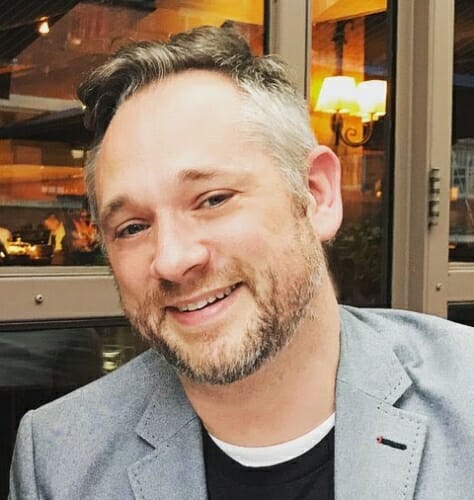New Faculty Focus: Seth Eaton
Seth Eaton: clinical assistant professor, Comparative Ophthalmology, Department of Surgical Sciences, School of Veterinary Medicine
Hometown: Philadelphia, PA
Educational/professional background: VMD, DACVO

Seth Eaton
Previous position: Veterinary Ophthalmologist – Ocular Services On Demand LLC; Adjunct Assistant Clinical Professor, School of Veterinary Medicine, University of California-Davis
How did you get into your field of research? My path to toward academic medicine and clinical research was ignited by my involvement in preclinical drug development and comparative vision science as a member of OSOD, a research consortium co-founded by Dr. Chris Murphy, a Professor Emeritus here at the University of Wisconsin. Thus, some of my research interest here is focused upon ocular pharmacology and toxicology in small animal patients, particularly with respect to glaucoma. However, I am also actively involved in investigating comparative ocular oncology, specifically the diagnosis and treatment of ocular squamous cell carcinoma in horses, and ocular melanocytic disorders and tumors in dogs and cats.
What attracted you to UW–Madison? UW–Madison’s School of Veterinary Medicine has an outstanding international reputation for both clinical service to the community, state, and beyond. This is even more impressive when one realizes that the SVM is one of the “youngest” in the United States, being at the forefront of many fields within our profession. I have also always been impressed with the numerous prior and active collaborations that exist between the SVM and the School of Medicine and Public Health and other Health Sciences Schools at the University. These collaborations have produced some incredible research and are models for the power of interprofessional partnerships.
What was your first visit to campus like? My first visit to campus was actually back in 2008 when I was a resident from California, attending the biennial Magrane Basic Science Course, an intensive 3-week ocular fundamentals course taught by some of the leaders in veterinary ophthalmology education and research. That year, it was held at the SVM. It was an incredibly memorable professional experience, being in Madison during the summer, living in the dorms on Lake Mendota, exploring State Street, and enjoying evenings on the Terrace. We always say that it felt like summer camp and I always look back on it fondly.
What’s one thing you hope students who take a class with you will come away with? When it comes to most fields in veterinary medicine, we have a lot to learn; and the crux of learning more and advancing the field comes from asking questions. Many of us are conditioned, whether due to experiences our education or our family lives or other cultural factors, to withhold the questions we have in our heads and maybe even to dismiss them. I want students to feel empowered to ask questions and to question why we do things a certain “way”; and in turn my promise as a clinician and educator is to be honest in admitting when I don’t have the answer. When there is an unanswered question, there is inherently a great deal of opportunity to learn and to advance our profession.
Is there a way your field of study can help the world endure and recover from the COVID-19 pandemic that has affected the health, finances and lifestyle of so many? I don’t know if my work can directly impact COVID-19 and the associated hardships. As a veterinarian, however, we do feel heavily tied in to public health and specifically being as knowledgeable as possible regarding any zoonotic factors associated with the pandemic. More immediately, however, we also feel a strong responsibility to be available to our clients to provide the most attentive and compassionate care for our animal patients. Veterinarians are so well aware of the importance of the human-animal bond; and now in this time of distress and hardship, the health and integrity of that bond stands to become an even more critical facet of human mental health and the comfort of “normalcy” in our newly disrupted lives. We certainly take that responsibility very seriously.
Do you feel your work relates in any way to the Wisconsin Idea? If one even briefly glances at the portfolio of the work, whether research, clinical service, or social service, that is being done and has been done at the SVM, it is clear that School is serving the State of Wisconsin and beyond at a high level and at a trajectory that will continue to serve the State, Nation, and world. Being lucky enough to be a member of the SVM and UW–Madison, it is my hope that my work would be able to contribute to that influence, and to benefiting animal health and public health for our State and beyond.
What’s something interesting about your area of expertise you can share that will make us sound smarter during video chats (and eventually parties)? An unfortunately common clinical scenario in veterinary medicine is the need to surgically remove an animal’s eye in order to alleviate the discomfort associated with painful and blinding ocular disease. In horses, particularly those that race or perform in other athletic events, many would assume this to be a major handicap and likely a career-ending scenario. In the 145-year history of the Kentucky Derby, however, at least four one-eyed horses have run the race. Though none of those four have placed higher than 13th in the Derby, some did go on to have surprisingly successful racing careers. The mysterious ways that animals compensate for vision impairment are remarkable and continue to amaze us in the veterinary medical field.
Hobbies/other interests: I am an avid Big Ten football fan, and a volleyball and tennis player. I am also a classically-trained double bassist and (before the pandemic interrupted our rehearsing) enjoyed being a member of the UW–Madison Health Sciences Orchestra. I look forward to getting back to playing volleyball and practicing with the orchestra when it is safe for us all to do so.
